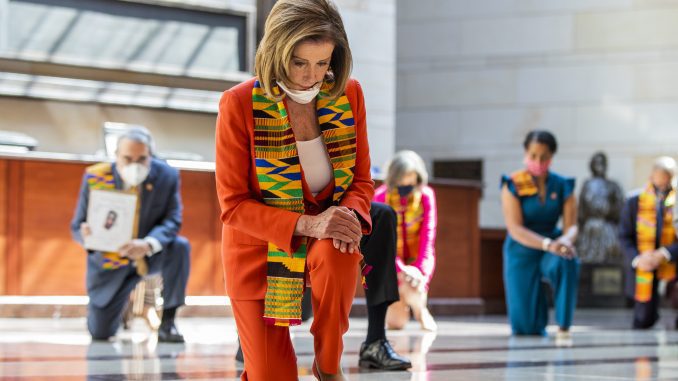
WASHINGTON, D.C. — President Donald Trump and his allies have seized on calls to “defund the police” as a dangerous example of Democratic overreach.
Key Democrats, including presumptive presidential nominee Joe Biden, are distancing themselves from the “defund” push, which some supporters say is a symbolic commitment to end systemic racism and shift policing priorities rather than an actual plan to eliminate law enforcement agencies.
Facing increasing pressure to weigh in, Biden addressed the issue in an interview with “CBS Evening News.”
“I don’t support defunding the police. I support conditioning federal aid to police based on whether or not they meet certain basic standards of decency, honorableness and, in fact, are able to demonstrate they can protect the community, everybody in the community,” Biden said.
Other opponents of the movement include Sen. Cory Booker, D-N.J., a former presidential candidate and one of two black Democratic senators, and Rep. Karen Bass, D-Calif., head of the Congressional Black Caucus.
NAACP President Derrick Johnson, in an interview, also declined to endorse calls to defund the police.
“I support the energy behind it. I don’t know what that substantively means. As I’m talking to people about the concept, I’ve gotten three different explanations,” said Johnson.
Republican pollster Frank Luntz, who thinks Democrats are well-positioned to win over the political center this fall, said Democrats risk their advantage by embracing policies viewed as radical following the death of George Floyd in Minneapolis.
Municipal officials in Minneapolis have endorsed the “defund the police” language backed by some civil rights activists and a handful of progressive House Democrats. Protesters over the weekend also painted “DEFUND THE POLICE” in large yellow letters on a street close to the White House.
Former Sen. Heidi Heitkamp, D-N.D., a white moderate who lost her 2018 reelection bid, said “defund the police” is “a horrible name” that misconstrues the goal.
“By starting with the word ‘defund,’ you’ve left the impression that you are doing something much more radical than what needs to be done,” said Heitkamp, a leader of the One Country Project, which is trying to help Democrats connect better with rural voters.
“This year has seen the lowest crime numbers in our Country’s recorded history, and now the Radical Left Democrats want to Defund and Abandon our Police,” Trump declared on social media. “Sorry, I want LAW & ORDER!”
The House GOP campaign arm sent out emails condemning “defund the police” and connecting it to Democratic candidates.
“No industry is safe from Democrats’ abolish culture,” said Michael McAdams, a spokesman for the National Republican Congressional Committee. “First they wanted to abolish private health insurance, then it was capitalism and now it’s the police. What’s next, the fire department?”
Democrats on Capitol Hill unveiled a sweeping proposal Monday that did not include plans to strip funding from the police. The package limits legal protections for police, creates a national database of excessive-force encounters and bans police choke holds, among other changes. The changes, if enacted, would have massive implications on policing in the U.S.
Democratic Rep. Matt Cartwright, who is white and represents a Trump-leaning district in northeastern Pennsylvania, rejected calls to defund the police outright.
“I don’t care how it’s named, I’m not for that,” he said, while noting he’s joined protest marches in his district.
Under the proposal, the federal civil rights law that governs police misconduct would no longer require prosecutors to prove that an officer’s actions were willful, a high burden of proof. The law would allow an officer to be charged for acting with reckless disregard for someone’s life, causing that person’s death.
Under current law, it is a federal crime to willfully deprive someone of their civil rights under the color of authority, but the officer also must have known what they were doing was wrong and against the law and decided to do it anyway. To prove that crime, prosecutors would need to convince a jury that the force used was more than what would be reasonably necessary to arrest or subdue a suspect, meaning convincing jurors that in the middle of an arrest the officer made a clear and willful decision to cause someone’s death.
Other measures in the legislation are likely to face significant hurdles to enact. And there are some that police officials are likely to argue could endanger officers’ lives.
The bill calls for a ban on “no knock” warrants, which are typically executed in some of the most dangerous investigations conducted by police departments. The legislation would specifically ban no-knock warrants for all federal drug cases and would require local and state law enforcement agencies to prohibit their use to qualify for some federal funding. Oregon and Florida are the only states that have outlawed such warrants.
A no-knock warrant, as its name implies, is an order from a judge that allows police to enter a home without prior notification to the residents, such as ringing a doorbell or banging on the door. In most cases, the law requires that officers must knock and announce themselves before entering a private home to execute a search warrant. Police would generally seek a no-knock warrant if the situation might be extraordinarily dangerous or if a suspect is likely to destroy evidence when police knock on the door.
It’s not clear whether the legislation will pass, especially in an election year. President Trump has criticized the package, claiming Democrats have “gone CRAZY.”



